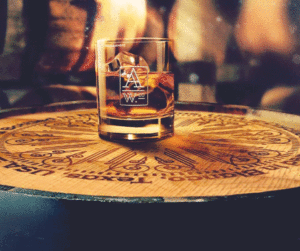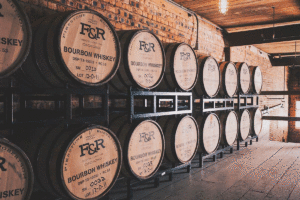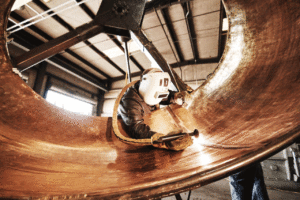 It used to be that you could look at a steer and tell where it came from by one look at the brand on its hide. But as more and more cowboys started to raise stock, the brands became as convoluted as the stock themselves. At the end of the day, the only thing that mattered to the consumer was if the stock produced a damn good steak to go with a potato and an after-dinner sip of whiskey that brought a long-awaited end to a hard day’s work.
It used to be that you could look at a steer and tell where it came from by one look at the brand on its hide. But as more and more cowboys started to raise stock, the brands became as convoluted as the stock themselves. At the end of the day, the only thing that mattered to the consumer was if the stock produced a damn good steak to go with a potato and an after-dinner sip of whiskey that brought a long-awaited end to a hard day’s work.
walk down the whiskey aisle of any decent spirits retailer in Texas these days will find a sizeable selection of Texas-labeled whiskeys. The craft distilling wave that has swept the country since around the year 2000 has taken Texas by storm as well, and the accompanying popularity of whiskeys has paralleled the growth in distilleries. Due to more restrictive prior laws and regulations, Texas is a relative newcomer to the craft spirits movement.
But as Texas does with everything seemingly, it went big quickly with distillers. There are over 100 active distilling licenses in Texas as of this writing, with more every week. And nearly half of them make (or intend to make) whiskey. In larger stores, there are literally dozens of Texas branded whiskeys to choose from. All claim Texas origin and some level of craft distilling pedigree. But not all whiskeys with a Texas brand were distilled by the people who bottled it or in the state of Texas.
So why don’t all whiskey producers in Texas distill 100% of their own spirits? That’s something longtime Texas whiskey (or whisky) standard bearers Balcones and Garrison Brothers wonder about, considering that the top selling Texas branded whiskeys are sourced and blended. To quote Garrison Brothers: “Most Texas distillers are honest about how they make their Texas whiskey. They’re just trying to build a business like anyone else. But a few are deceitful.” For some distilleries, it’s their business model; most of these producers are upfront about their content on the label.
 Others view the essence of the craft as being what happens to the spirit after it is distilled, when maturing in oak barrels baked by the Texas climate. For many, however, it’s a financial stepping stone to selling their own distilled whiskey. Creating any aged spirit is a time-intensive and expensive process, with the financial payoff for whiskey distilled today likely several years in the future. Most startup craft distilleries need to find ways to offset their costs until the whiskey they dreamed of sharing with the public is ready for distribution.
Others view the essence of the craft as being what happens to the spirit after it is distilled, when maturing in oak barrels baked by the Texas climate. For many, however, it’s a financial stepping stone to selling their own distilled whiskey. Creating any aged spirit is a time-intensive and expensive process, with the financial payoff for whiskey distilled today likely several years in the future. Most startup craft distilleries need to find ways to offset their costs until the whiskey they dreamed of sharing with the public is ready for distribution.
One way to do that is bottling and selling sourced whiskeys. But distillers that are making the effort to be truly Texan feel at a big disadvantage, and their only way to fight back is to point out their effort at authenticity. Guy Endsley at Fire Oaks Distillery in Liberty Hill put it “This has been a big issue for us. I believe that one of the reasons why we have achieved what we have is that we make our own.”
Many of the whiskeys labeled as being from Texas contain spirit entirely distilled elsewhere – generally sourced (remember that word) from large producers in Kentucky, Tennessee, Missouri, Indiana, or even Canada. The practice is most prevalent with vodka – the number of vodkas in Texas that were 100% distilled in Texas from mill to still can be counted on the fingers of one hand, and Tito’s isn’t one of them – but is common with whiskey as well. Some whiskeys are simply purchased in bulk already aged then bottled under a new label.
A few are sourced, blended, and/or further matured in Texas before bottling.
 There are even whiskey blends containing NGS (neutral grain spirits – basically vodka). Many use Texas water for proofing (diluting to bottle strength) to add Texas character. However, a growing number of craft distillers in Texas distill and age 100% of their alcohol on premises. So how do you tell them apart? A careful study of the label is the key. The words “distilled by” are a decent indicator of true Texas provenance, as are phrases like “grain-to-glass”, “mill-to-still”, and “farm-to-bottle”. Terms to be cautious of are “produced in”, “made in”, “bottled in”, and “blended in”. Those usually mean the whiskey inside was sourced elsewhere.
There are even whiskey blends containing NGS (neutral grain spirits – basically vodka). Many use Texas water for proofing (diluting to bottle strength) to add Texas character. However, a growing number of craft distillers in Texas distill and age 100% of their alcohol on premises. So how do you tell them apart? A careful study of the label is the key. The words “distilled by” are a decent indicator of true Texas provenance, as are phrases like “grain-to-glass”, “mill-to-still”, and “farm-to-bottle”. Terms to be cautious of are “produced in”, “made in”, “bottled in”, and “blended in”. Those usually mean the whiskey inside was sourced elsewhere.
Does it really matter as to how authentic the provenance of a whiskey may be? Ask anyone from Kentucky and all the requirements a distiller must answer to in order to be called a bourbon and you will come to understand that distillers and whiskey drinkers emphasize the provenance as a badge of distinction that keys in on the craft and attention to detail that one would come to expect from a certain whiskey. Distillers work hard to create a flavor palette that carries a unique set of qualities that separate it from the herd of offerings found at your local liquor store.
This distinction ties in to the marketing of its product and brand recognition. And with the variety of customers seeking out Texas whiskey, you better believe that provenance matters. In order to broaden its offerings, a distiller often provides do both styles of whiskey. Many of the blended or sourced whiskeys sold as Texan are excellent and have been winning prestigious awards.
These awards backed by increased consumption have given rise to the birth of a more authentic Texas distilled whiskey that is taking shape with every sip. Just three or four years ago the number of distilleries selling 100% Texas distilled whiskey could be counted on one hand.
Now the number distilling all the alcohol in at least one of their whiskeys is over twenty. Many craft distillers have been around long enough now to put out one or more truly Texas distilled whiskeys, and their number is starting to rival those of the sourced whiskey producers.
 Most of these distillers endeavor to source as many of their ingredients as possible from Texas. Many work closely with local farmers, maltsters, and grain mills to ensure the best quality ingredients. Jared Himstedt, Head Distiller at Balcones stated “Texas has a lot of promising wood options for either aging spirits with or smoking grain with. We are finally having a decent amount of barley grown and malted in state, along with some heirloom strains of rye and other grains that are super promising for distillers and brewers both to play with.”
Most of these distillers endeavor to source as many of their ingredients as possible from Texas. Many work closely with local farmers, maltsters, and grain mills to ensure the best quality ingredients. Jared Himstedt, Head Distiller at Balcones stated “Texas has a lot of promising wood options for either aging spirits with or smoking grain with. We are finally having a decent amount of barley grown and malted in state, along with some heirloom strains of rye and other grains that are super promising for distillers and brewers both to play with.”
Corn and wheat have always been accessible in Texas, but getting distilling quality rye and malted barley has been a challenge until recently. The demand from craft distillers looking for local ingredients and being willing to work with farmers to guarantee quality and consistent income has been a key factor in that change. All Texas distillers use locally sourced water (even if many process it by reverse osmosis filtration first). A growing number use captured rainwater.
One – Firestone & Robertson – went so far as to develop their own yeast from a local strain they discovered in a pecan tree. Other are following suit.
For whiskey aficionados for whom this local and craft distinction is an important consideration in purchasing, here is a reasonably complete list of whiskey bottles that are 100% Texas distilled and where to find them. For those who prefer single malts to bourbon, Texas distillers have that covered as well.
Distillery: Alamo Premium Distillery, San Antonio
(alamopremiumdistillery.com)
Price: $33 Where to Buy: San Antonio, Austin,
Dallas/Ft. Worth
Notes: Currently called Texas Craft Whiskey – name and label are changing summer 2017 – some previous stock may still be on shelves.
Distillery: Andalusia Whiskey Co, Blanco
(andalusiawhiskey.com)
Price: $60 Where to Buy: Central Texas, at the distillery
Notes: Three quarters of their facility is tasting room. Worth a visit.
Distillery: Balcones Distilling, Waco
(balconesdistilling.com)
Price:$40+ Where to Buy: Nationwide
Notes: The three above are just a sample – Balcones make several whiskies and they all qualify as 100% Texan. Look for a new 100% Rye Whisky in late 2017 and some new Single Malt and Peated Whiskies as well.Distillery: Banner Distillery, Manor
(bannerdistilling.com)
Price: $38 Where to Buy: Larger cities in Texas
Notes: Double oaked version and distilled craft beer whiskies available at the distillery.
Distillery: Bone Spirits, Smithville
(bonespirits.com)
Price: $36 Where to Buy: Texas statewide
Notes: The delicious aged 100% Corn Whiskey is only available at the distillery.
Distillery: Fire Oak Distillery, Liberty Hill
(fireoakdistillery.com)
Price: n/a Where to Buy: At distillery – limited
availability in stores summer 2017
Notes: Bottle and label style have recently changed. Both types may be in stock. Single barrel also available in places.
Distillery: Firestone & Robertson Distilling Co., Ft. Worth (frdistilling.com)
Price: $40 Where to Buy: Major cities in Texas,
more every week
Notes: Black snakeskin neck band only – the white muslin neck band is a blend.
Distillery: Garrison Brothers Distillery, Hye
(garrisonbros.com)
Price: $75 Where to Buy: National distribution
Notes: Smaller releases and single barrel are available at the distillery and some stores. Look for new double-wood releases in fall of 2017, other recipes as well.
Distillery: Herman Marshall Distillery, Garland
(dallasdistilleries.com)
Price: $33+ Where to Buy: Texas statewide
Notes: Look for the upcoming 80 proof blended (but not sourced) whiskey
Distillery: The Distillery at Kiepersol, Tyler
(kiepersol.com)
Price: $48 Where to Buy: Larger cities in Texas,
at the distillery
Notes: Small distillery in the middle of vineyards
and a winery.
Distillery: Five Points Distilling, Forney (lone-elm.com)
Price: $50 Where to Buy: Limited distribution
in Texas, Arkansas
Notes: Next up is a barrel strength Wheat Whiskey
Distillery: Old Humble Distilling, Humble
(oldhumbledistilling.com)
Price: $45+ Where to Buy: Houston area,
some distributioin
Notes: Small barrel maturation
Distillery: Ranger Creek Brewing & Distilling, San Antonio (drinkrangercreek.com)
Price: $30+ Where to Buy: Texas-wide for
.36 Straight Bourbon, others
limited or at distillery.
Notes: Ranger Creek also makes beer, and even distills some of their whiskies from their beer recipes.
Distillery: Real Spirits Distilling, Blanco
(realspiritsdistilling.com)
Price: $50 Where to Buy: At the tasting
room only
Notes: Real Ale is first and foremost a brewery, and they distill their whiskey from their Devil’s Backbone Belgian Tripel.
Distillery: Western Son Distillery, Pilot Point (westernsondistillery.com)
Price: $30 Where to Buy: Larger cities in Texas, smaller releases at distillery
Notes: A portion of Red River’s profits go to the Native Texas Wildlife Conservation.
Distillery: Rio Brazos Distillery, College Station (boxcarwhiskey.com)
Price: $60 Where to Buy: Major Texas cities
Notes: Only their bourbon – Boxcar Whiskey is sourced.
Distillery: Rocking M Ranch Distillery, Henrietta (rockingmranchdistillery.com)
Price: $45 Where to Buy: Limited in the
Dallas-Ft-Worth area and locally
Notes: Aged 2 ½ Years.
Distillery: Spirit of Texas Distilling, Pflugerville (spiritoftx.com)
Price: $50 Where to Buy: Limited Twin Liquors stores and at distillery
Notes: The distillery has had some issues getting their whiskey wider distribution, but should have it solved by late Summer 2017.
Distillery: Swift Distillery, Dripping Springs
(swiftdistillery.com)
Price: $50 Where to Buy: Major Texas cities
Notes: The original is finished in Sherry casks.
Coming Summer 2017 will be a Sauternes cask finish.
Distillery: Treaty Oak Distilling, Dripping Springs (treatyoakdistilling.com)
Price: $50 Where to Buy: limited availability in stores, or at the tasting room
Notes: The label will be changing soon (Fall 2017?) to Treaty Oak Texas Bourbon. Their Redhanded Bourbon is sourced.
Distillery: Whiskey Hollow Distillery, Valley View
(whiskeyhollwdistillery.com)
Price: $150 Where to Buy: limited in Dallas-
Ft. Worth area, starting to spread beyond.
Notes: An unusual single malt bourbon.
Distillery: Whitmeyer’s Distillling Co., Houston
(whitmeyers.com)
Price: $65 Where to Buy: At the tasting room,
some limited local availability
Notes: Their other whiskies are sourced, but they have limited releases of their own whiskey at the distillery.
Distillery: Witherspoon Distillery, Lewisville (witherspoondistillery.com)
Price:$38+ Where to Buy:statewide in Texas
Notes: They also sell a Barrell Strength
Straight Bourbon.
Distillery: Yellow Rose Distilling, Houston
(yellowrosedistilling.com)
Price: $55 Where to Buy: statewide in
Texas
Notes: They sell a number of whiskies, but
only these two are distilled in-house.
By Harry Jarvis and David Ventura Garcia